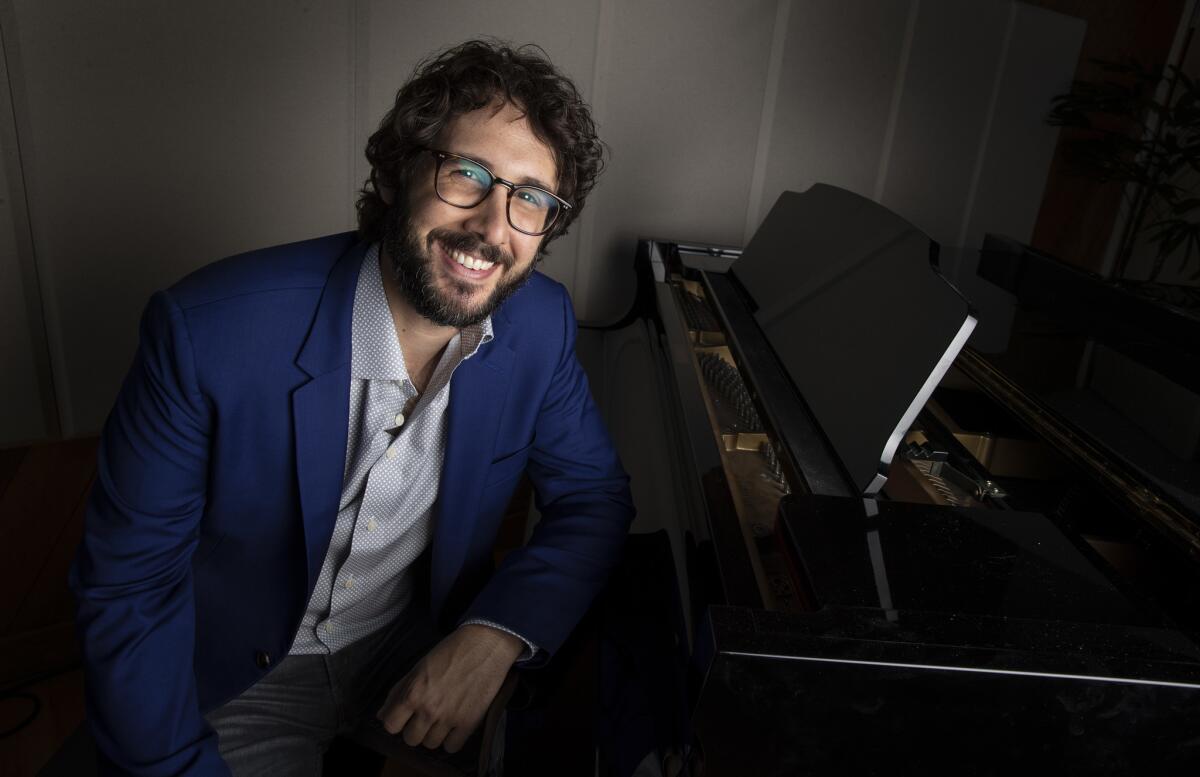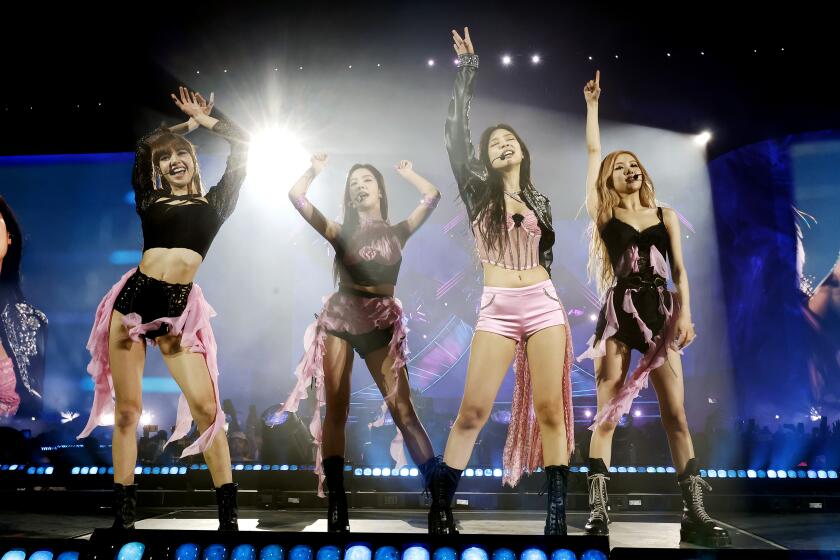Q&A: Josh Groban on his serious new album and his goofy new sitcom

- Share via
The last few years have been big ones for Josh Groban, Musical Theater Nut.
In 2015, the pop-classical singer famous for his big voice (and his boyish looks) earned a Grammy nomination for his album “Stages,” which featured renditions of classic Broadway tunes from the likes of “Carousel” and “Les Misérables.”
The next year, he made his debut on the Great White Way with a starring role in “Natasha, Pierre & the Great Comet of 1812,” an experimental adaptation of Tolstoy’s “War and Peace.” Then, in June, he co-hosted the Tony Awards with Sara Bareilles.
“What can I say?” Groban, 37, asked over coffee on a recent morning in Burbank. “I like diving into things.”
Now the Los Angeles native, who dropped out of Carnegie Mellon University when he signed a record deal at age 18, is showcasing two of his other guises.
On Friday, he releases “Bridges,” a new album that revisits the sweeping style of his early work (but in songs he co-wrote). That same day, Netflix premieres “The Good Cop,” a quirky comedy series from “Monk” creator Andy Breckman, in which Groban portrays the squeaky-clean son of a disgraced police officer played by Tony Danza.
What did you learn from doing Broadway?
It toughened me up. This business is hard anyway, but eight shows a week was unlike anything I’ve experienced before. Broadway also teaches you the power of collaboration. You’re a cog in a wheel. This was an ensemble cast, and most of the actors came from way off-Broadway; they were musicians with their own bands or orchestras, which I’d go see every time I had a day off. My album would not have happened if it wasn’t for the inspiration I got from the cast.
Were you thinking about the album as you did the show?
You spend a lot of hours in your dressing room, so I had a little keyboard set up and was constantly throwing ideas down on my iPhone. After having done a musical theater album that then led into a Broadway run, I was just feeling that itchiness to write songs again.
Before “Stages,” you made two albums of your own tunes, including a relatively stripped-down record produced by Rick Rubin. That one kind of reframed you as a sensitive folkie — not the kid blasting away like a mini Andrea Bocelli.
If there was one thing I felt I could’ve handled differently with the Rick process, it was that I was so focused on the songwriting that I kind of stopped focusing on my voice for a minute. I said, “I’m a little burnt out having to be the hit-the-money-note guy.”
You sound apologetic about it.
Not apologetic — just aware. I was wound pretty tight when I first went to Rick. There was a certain producing style that I was used to, which was very performance-driven. Each day you had to leave a pint of blood.
Do you think you succeeded in establishing a more realistic picture of Josh Groban?
I think I did all right. My fanbase was split down the middle. But it certainly opened a confidence zone in me to feel like I could approach these albums from a more personal space, whatever the style of production. I realized I don’t need the magic feather — it’s something I have in me, and I can continue to do it.
Because it seemed less personal, “Stages” struck me as something of a retreat.
When I was doing the Rick record, I got a lot of kudos from journalists: “I appreciate that you’re taking this risk.” But I think there’s sometimes a consensus that stepping out of your lane is commendable, but then, when you make a conscious decision to hit the sweet spot of what your voice wants to do really well — that somehow the energy and the work that goes into that is not as valid because it doesn’t have the edge quotient. I was terrified making a musical theater record!
Why?
Because I didn’t dream of being a singer-songwriter when I was five years old — I dreamed of singing the songs on “Stages.” People said writing songs was brave, but I was fearless going into that; I was living my teenage rebellion at, like, 30. With “Stages,” I felt a reverence and a nervousness about singing those songs, and I had to dig myself out of that hole emotionally every time I went into the vocal booth.
“Bridges” finds a middle ground between the two approaches. It uses powerful vocals to tell intimate stories.
I agree. It’s got what I wanted to say about my own life experiences. But I wasn’t afraid to reestablish a certain sound to my singing.
So you’ve done all this work to dismantle the widely held image of you as an angelic boy wonder. But on TV, you’re basically back to that in “The Good Cop.”
The other characters call me the choirboy.
Exactly! What a perverse choice.
My character is tone-deaf, though, so there’s no angelic singing, at least. Look, there were many years where I might not have been comfortable being that earnest because I felt at the time that the whole picture of me wasn’t entirely accurate. Now that I’ve been able to do some weird stuff, I feel lucky to have an opportunity to do something like this. And the difference is that I’m taking ownership of that perception — I’m doing it in a tongue-in-cheek way.
Your portrayal is funnier because of what we know of your history.
Totally. Knowing that Andy Breckman was always going to do things with a wink and a nudge — that did not go unnoticed by me when I read the pilot. Also, anytime you’re playing somebody with “good” in the title, there’s all kinds of room to break bad.
Could you have pulled off the role without first acting on Broadway? You’ve done small parts on TV.
I don’t think so. I didn’t have an acting technique; I just did some funny stuff on “The Office.” But [“Great Comet” director] Rachel Chavkin went through every line with me, word by word. In four or five months of rehearsal, she was able to do with me what I would’ve continued doing had I finished at Carnegie Mellon. She taught me what my process needed to be regardless of the environment.
How long did you spend making “The Good Cop”?
We shot for almost five months.
That’s a chunk of time. And you’re touring this fall. Do you think differently now than you did in your 20s about how to balance your professional and personal lives?
Definitely. There was a point in my mid to late 20s when I felt like a heart surgeon with a pager. I was thrown into a professional master class at a young age, but I was such a late bloomer in terms of prioritizing my personal life. You have to communicate with the people close to you, and that was something I learned the hard way a couple of times.
That said, I still love to work; it’s something that comes up a lot in the relationship I’m in currently [with actress and writer Schuyler Helford]. I’d love to have a family one day. But I want to be the father that my dad has been to me. My dad would go to work in the morning, come home and have a scotch and help me with my homework. I want desperately to be that. Anything less really scares me.
More to Read
The biggest entertainment stories
Get our big stories about Hollywood, film, television, music, arts, culture and more right in your inbox as soon as they publish.
You may occasionally receive promotional content from the Los Angeles Times.








